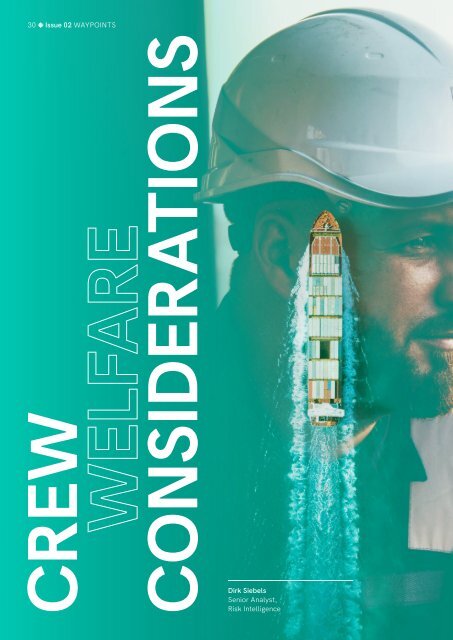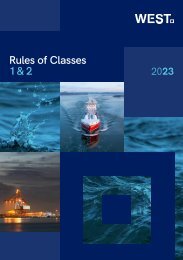Waypoints Issue 02: Wellness at Sea, Wellness on Shore
The second issue of Waypoints magazine takes the mental health of mariners as its focus. Our staff outline beneficial techniques for self-awareness and reflection, highlight compassionate crew welfare policies, look at amendments to the Maritime Labour Convention designed to protect seafarers abandoned by their employers, and emphasise the critical importance of the next steps. Also included are features on the International Group’s ongoing work to provide consistent cover for its stakeholders irrespective of global trading fluctuations, and the wisdom of implementing delay insurance. Our New York branch comes under the office profile spotlight, and we present another round-up of recent arbitrations.
The second issue of Waypoints magazine takes the mental health of mariners as its focus. Our staff outline beneficial techniques for self-awareness and reflection, highlight compassionate crew welfare policies, look at amendments to the Maritime Labour Convention designed to protect seafarers abandoned by their employers, and emphasise the critical importance of the next steps. Also included are features on the International Group’s ongoing work to provide consistent cover for its stakeholders irrespective of global trading fluctuations, and the wisdom of implementing delay insurance. Our New York branch comes under the office profile spotlight, and we present another round-up of recent arbitrations.
Create successful ePaper yourself
Turn your PDF publications into a flip-book with our unique Google optimized e-Paper software.
30<br />
<str<strong>on</strong>g>Issue</str<strong>on</strong>g> <str<strong>on</strong>g>02</str<strong>on</strong>g> WAYPOINTS<br />
WAYPOINTS <str<strong>on</strong>g>Issue</str<strong>on</strong>g> <str<strong>on</strong>g>02</str<strong>on</strong>g> 31<br />
CREW<br />
WELFARE<br />
CONSIDERATIONS<br />
Dirk Siebels<br />
Senior Analyst,<br />
Risk Intelligence<br />
Gulf of Guinea<br />
Razor wire al<strong>on</strong>g the railing, c<strong>on</strong>stant vigilance <strong>on</strong> the bridge and an armed<br />
escort vessel off the stern – oper<str<strong>on</strong>g>at</str<strong>on</strong>g>i<strong>on</strong>s in the Gulf of Guinea are unusual<br />
and often highly stressful for crews <strong>on</strong> merchant ships<br />
The Gulf of Guinea is widely known as a<br />
hotspot for piracy and – as the Intern<str<strong>on</strong>g>at</str<strong>on</strong>g>i<strong>on</strong>al<br />
Maritime Bureau recently pointed out –<br />
c<strong>on</strong>tinues to be ‘particularly dangerous<br />
for seafarers’.<br />
Frequent reports about <str<strong>on</strong>g>at</str<strong>on</strong>g>tacks against<br />
merchant vessels and about seafarers being<br />
taken as hostages are an understandable<br />
cause for anxiety. For ship oper<str<strong>on</strong>g>at</str<strong>on</strong>g>ors,<br />
it is vital to address these issues. They<br />
should provide a realistic assessment of<br />
the situ<str<strong>on</strong>g>at</str<strong>on</strong>g>i<strong>on</strong> to assist in dispelling myth<br />
and rumor, implement mitig<str<strong>on</strong>g>at</str<strong>on</strong>g>i<strong>on</strong> measures<br />
and ensure vigilance as well as regular<br />
drills. Physical measures – in line with the<br />
guidelines set out in BMP West Africa – are<br />
important, but they provide much more<br />
protecti<strong>on</strong> in combin<str<strong>on</strong>g>at</str<strong>on</strong>g>i<strong>on</strong> with a welltrained,<br />
briefed and prepared crew.<br />
The importance of regular drills has been<br />
highlighted by various incidents in recent<br />
years. One particularly striking example<br />
was an <str<strong>on</strong>g>at</str<strong>on</strong>g>tack against a tanker vessel off<br />
Nigeria in 2019. The ship was targeted <str<strong>on</strong>g>at</str<strong>on</strong>g><br />
dawn and the crew immedi<str<strong>on</strong>g>at</str<strong>on</strong>g>ely sounded<br />
the alarm when they observed an<br />
incoming speedbo<str<strong>on</strong>g>at</str<strong>on</strong>g>.<br />
Well-protected<br />
vessels are less<br />
likely to be targeted<br />
This level of vigilance allowed most crew<br />
members to assemble in the citadel,<br />
from where they were l<str<strong>on</strong>g>at</str<strong>on</strong>g>er rescued by<br />
Nigerian naval forces. However, <strong>on</strong>e young<br />
cadet – who was <str<strong>on</strong>g>at</str<strong>on</strong>g> sea for <strong>on</strong>e of his first<br />
voyages – was not familiar with the ship and<br />
unable to find the citadel. The young man<br />
was kidnapped by the <str<strong>on</strong>g>at</str<strong>on</strong>g>tackers, who kept<br />
him in a hostage camp for several weeks<br />
before releasing him after a ransom had<br />
been paid. Had this young man been<br />
drilled correctly, it is highly likely he would<br />
have made it to the citadel and avoided<br />
being taken – obviously a far better<br />
outcome for him but also for the vessel<br />
oper<str<strong>on</strong>g>at</str<strong>on</strong>g>or and insurer.<br />
Ship oper<str<strong>on</strong>g>at</str<strong>on</strong>g>ors should also pay <str<strong>on</strong>g>at</str<strong>on</strong>g>tenti<strong>on</strong><br />
to seemingly basic security measures;<br />
a topic which has also been highlighted<br />
frequently in recent years. It is unlikely to be<br />
a coincidence th<str<strong>on</strong>g>at</str<strong>on</strong>g> many ships which have<br />
been <str<strong>on</strong>g>at</str<strong>on</strong>g>tacked in the Gulf of Guinea had<br />
failed to employ effective countermeasures.<br />
Several m<strong>on</strong>ths ago, this problem was<br />
illustr<str<strong>on</strong>g>at</str<strong>on</strong>g>ed by an <str<strong>on</strong>g>at</str<strong>on</strong>g>tack against an anchored<br />
tanker. Several crew members were<br />
kidnapped when the ship was boarded<br />
by armed men in the middle of the night.<br />
While it is very likely th<str<strong>on</strong>g>at</str<strong>on</strong>g> the vessel was<br />
randomly selected, it should be noted th<str<strong>on</strong>g>at</str<strong>on</strong>g><br />
similar vessels <str<strong>on</strong>g>at</str<strong>on</strong>g> the same anchorage were<br />
fitted with razor wire and other protecti<strong>on</strong><br />
measures, making it much harder to board<br />
them without being detected. The outward<br />
dem<strong>on</strong>str<str<strong>on</strong>g>at</str<strong>on</strong>g>i<strong>on</strong> of preparedness is a key<br />
element of security – deterring would-be<br />
<str<strong>on</strong>g>at</str<strong>on</strong>g>tackers from even trying to board. While<br />
these measures can take time out of an<br />
already busy crew schedule, it is critical th<str<strong>on</strong>g>at</str<strong>on</strong>g><br />
they understand why they are doing it and<br />
therefore th<str<strong>on</strong>g>at</str<strong>on</strong>g> it needs to be d<strong>on</strong>e to a high<br />
standard r<str<strong>on</strong>g>at</str<strong>on</strong>g>her than just a token effort.<br />
Overall, past experiences show th<str<strong>on</strong>g>at</str<strong>on</strong>g><br />
well-protected vessels are less likely to<br />
be targeted and successfully boarded<br />
by opportunistic <str<strong>on</strong>g>at</str<strong>on</strong>g>tackers. In some<br />
areas, notably off Nigeria, protecti<strong>on</strong> may<br />
include the use of security escort vessels,<br />
which are provided by a broad range of<br />
companies and partly manned by Nigerian<br />
Navy pers<strong>on</strong>nel. In additi<strong>on</strong>, shipping<br />
companies must ensure an appropri<str<strong>on</strong>g>at</str<strong>on</strong>g>e<br />
level of situ<str<strong>on</strong>g>at</str<strong>on</strong>g>i<strong>on</strong>al awareness, enabling<br />
them to provide regular upd<str<strong>on</strong>g>at</str<strong>on</strong>g>es about<br />
recommended routes or areas to avoid<br />
to their masters.<br />
When physical measures are not enough<br />
and <str<strong>on</strong>g>at</str<strong>on</strong>g>tackers are able to overcome them,<br />
it is essential th<str<strong>on</strong>g>at</str<strong>on</strong>g> every crew member<br />
knows precisely wh<str<strong>on</strong>g>at</str<strong>on</strong>g> to do and how<br />
to find the citadel.










